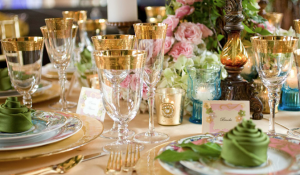
Thousands of people each year plan their own wedding and decide to become a wedding planner. Wedding planning is hard work both emotionally and physically and there is much to learn, but it is also fun! Many colleges are now offering accredited training and degree programs to help you make a success of your wedding planner career.
Working with a paying client to plan their wedding involves dealing with the family dynamics, having knowledge of many reputable vendors, the ability to coordinate a wedding day when you’ll be on your feet for up to sixteen hours, designing weddings to meet the couple’s style and theme. You’ll have to be organised and accurate in your planning of time and budget, be able to negotiate and agree contracts with vendors as well as ensuring you have the skills to run a business with licenses, insurance, advertising, networking, staff-hire, marketing, accounting and more.
If you want to become a wedding planner here are some things to consider before you get started and how you can plan for success:
1. Does wedding planning fit you and your ideal lifestyle?
Wedding planners often work in the evenings and on weekends to meet with clients and to coordinate the wedding plans. You may have a couple of days off in the week, but does this suit your life-style if your family and friends work 9-5? You will be very busy in wedding months between Spring and Fall. This may impact on your personal social calendar.
As their wedding planner, you are often the confidant, psychologist and mediator for the couple getting married and their families too. At all times, can you stay calm, care about your clients and be a good listener? If yes, you may love this career.
2. What certification or classes are needed to become a wedding planner?
There are many ways to learn and be certified as a wedding planner: mentoring programs, community college classes and wedding planner conferences to help you get experience and support to be happy and successful in your business.
To evaluate the best training to suit your skills to be a wedding planner, make a list of all the experience you have that you can bring to the role, from event planning at work, business or marketing experience etc. There may be gaps you want to fill or you may prefer a comprehensive course.
3. Become a certified wedding planner
Being a certified wedding planner reassures clients that you are a regulated professional in the field with on-going education, networking, resources and the ability to follow the wishes and latest trends the wedding couple request. You may wish to work towards a specific accreditation and association endorsement that is recognised nationwide. You may wish to specialise in wedding production and design if that is your passion. Destination planning is another string to your bow if you have strong contacts with overseas vendors and foreign language skills for the destination of choice.
